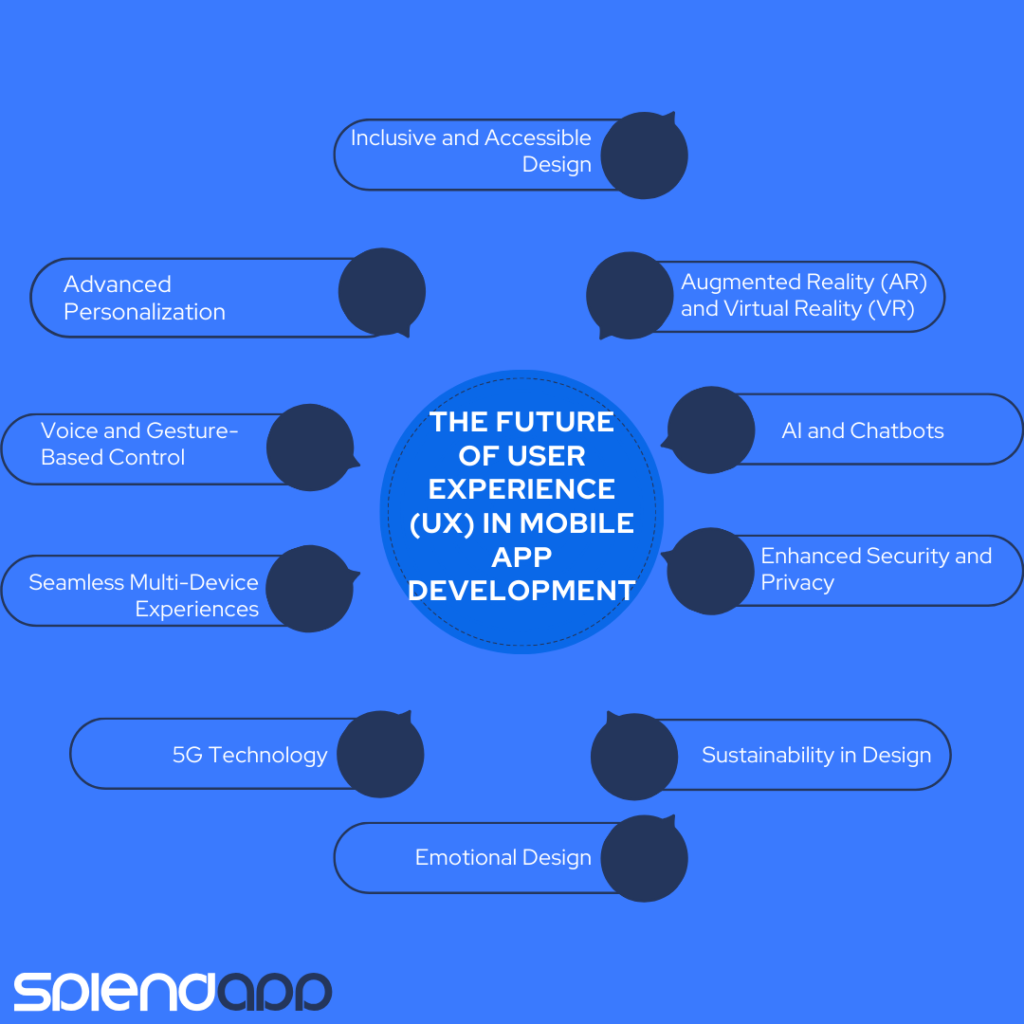

The Future of User Experience (UX) in Mobile App Development is an exciting and dynamic field, marked by rapid technological advancements and evolving user expectations. As we move forward, several key trends and developments are shaping the landscape of UX in mobile applications:

Advanced Personalization: Future mobile apps are expected to leverage data analytics and machine learning to offer deeply personalized experiences. This means apps will adapt to user preferences, behaviors, and contexts in real-time, providing more relevant and tailored content.
Augmented Reality (AR) and Virtual Reality (VR): The integration of AR and VR technologies in mobile apps is set to transform user experiences by offering immersive and interactive environments. This will not only enhance gaming and entertainment apps but also practical applications in education, retail, and healthcare.
Voice and Gesture-Based Control: As voice assistants and gesture recognition technologies become more sophisticated, we’ll see a shift towards more natural and intuitive ways of interacting with mobile apps. This will reduce reliance on traditional touch-based inputs.
AI and Chatbots: Artificial Intelligence (AI) and chatbots will continue to play a significant role in improving UX by providing instant customer support, personalized recommendations, and automated services.
Seamless Multi-Device Experiences: The future of UX in mobile apps will also focus on creating seamless experiences across various devices, including smartphones, tablets, wearables, and smart home devices. This approach ensures a consistent and continuous user experience irrespective of the device being used.
Enhanced Security and Privacy: As users become more conscious of their digital security and privacy, mobile apps will need to prioritize these aspects without compromising on the user experience. Biometric authentication and advanced encryption techniques will become standard features.
5G Technology: The roll-out of 5G will enable faster, more reliable internet connections, allowing mobile apps to function more efficiently and incorporate more data-intensive features like high-definition video streaming and real-time data synchronization.
Sustainability in Design: With a growing emphasis on environmental sustainability, mobile app development will likely incorporate eco-friendly design principles, focusing on energy efficiency and reduced digital waste.
Inclusive and Accessible Design: There will be a stronger emphasis on making apps accessible to all users, including those with disabilities. This means designing apps that are usable for people with a wide range of abilities and in various environments.
Emotional Design: Going beyond usability, future UX design will increasingly focus on emotional engagement, creating experiences that resonate on a deeper emotional level with users.
The importance of User Experience (UX) in mobile app development cannot be overstated. In an era where mobile apps saturate the market, delivering an outstanding UX is crucial for the success and sustainability of an app. Here are some key reasons why UX is so pivotal in mobile app development:
User Retention and Engagement: A well-designed UX keeps users engaged and encourages them to keep using the app. Positive experiences lead to higher retention rates, which is essential in a competitive market where users have many alternatives.
Brand Perception and Loyalty: The UX of an app significantly impacts the user’s perception of the brand. A smooth, intuitive, and enjoyable UX can enhance brand reputation and foster user loyalty, whereas a poor UX can drive users away.
Increased Conversion Rates: For apps with commercial goals, such as e-commerce platforms, a good UX design can directly influence conversion rates. An intuitive and efficient checkout process, for example, is more likely to result in completed purchases.
Reduced Development Costs: Investing in UX design in the early stages of app development can help identify potential issues before they become costly to fix post-launch. This foresight can reduce long-term development costs and the need for frequent updates or fixes.
Differentiation from Competitors: In a crowded app marketplace, a superior UX can be a key differentiator that sets an app apart from its competitors. An app that offers a unique, user-friendly experience is more likely to stand out.
Accessibility and Inclusivity: Good UX design takes into account the diverse needs of users, including those with disabilities. An accessible app not only reaches a wider audience but also demonstrates a commitment to inclusivity.
Reduced Support Costs: Apps with intuitive UX design can diminish user confusion and the need for extensive customer support. This not only improves user satisfaction but also reduces the resources needed to manage customer support.
Enhanced User Satisfaction: Ultimately, the goal of UX is to satisfy users. A satisfying user experience is more likely to result in positive reviews and recommendations, which are crucial for an app’s growth and reputation.
User-Centered Design: UX design puts the user at the center of the development process. This approach ensures that the app meets real user needs and solves specific problems, making it more relevant and valuable to the target audience.
Increased Revenue: For many apps, particularly those in the e-commerce and subscription-based sectors, a great UX can lead to increased revenue. When users find an app enjoyable and easy to use, they are more likely to make purchases or subscribe to services offered.
In conclusion, The Future of User Experience (UX) in Mobile App Development promises to be more personalized, immersive, intuitive, and inclusive, driven by advancements in technology and a deeper understanding of human behavior and preferences. This evolution will not only enhance user satisfaction but also open up new possibilities for innovation and engagement in the mobile app space.
You can learn more from here the User-Centered Design and the Principles for Creating Engaging Mobile Apps.